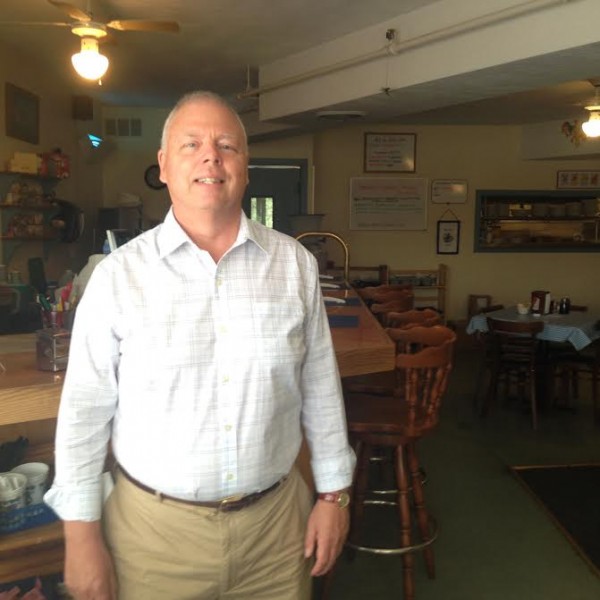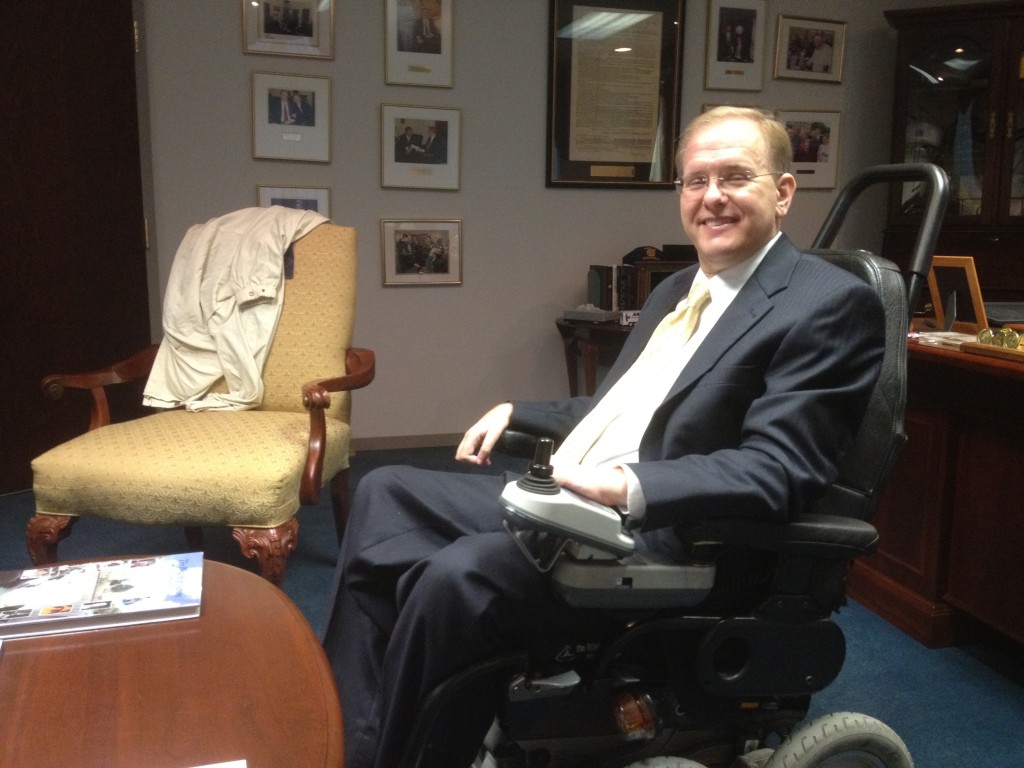
In many ways, Congressman Jim Langevin and upstart progressive challenger John Hamilton have a lot in common even as they compete in the Democratic primary for the second congressional district seat.
For example, they both think Langevin is a strong favorite to win.
“It’s an uphill battle,” Hamilton said. “He has a lot of money and he’s the incumbent. All the advantages go to the incumbent.”
Langevin said, “I’m hopeful and optimistic about it. I feel good about the race, but never overconfident.”
And both describe themselves as being progressive.
“I’m a progressive from way back,” Hamilton said, “which used to be known as a liberal.”
Langevin said, “If you look at my voting record I think I have a very progressive voting record.”
On policy matters, too, Langevin and Hamilton agree more often than they disagree. Both cited income inequality as the biggest issue facing America.
“To my view concentrated wealth at the top is the problem,” said Hamilton.

Langevin said, “We talk about fighting for a living wage and closing the income gap and trying to create an economic system that the vast majority of American families would benefit under, as opposed to the 1 percent, I’m a pretty consistent vote on all of those things.”
It’s the subtle differences in their responses that shows why Hamilton is challenging Langevin, despite conceding that “we’re both pretty good” when asked where the two candidates find agreement.
“I’m seeking to be a change agent in this election,” said Hamilton, who was inspired to run for congress by Bernie Sanders.
Langevin, the eight-term Democrat first elected in 2000, said, “It is my job to reflect the views of my constituents, the people I represent, and I hope I’ve been doing that effectively.”
Both are voting for Hillary Clinton in November, but Langevin is an avid supporter of hers and Hamilton, who served two terms in the state legislature in the early 1980’s, more reluctantly. He says he returned to politics only because “both parties are taking a wrong direction.” For 30 years, less-than-liberal Democrats helped Republicans and corporations ruin the American middle class, according to Hamilton.
“The Democratic Party took a wrong direction in the 1990’s,” he said. “We had the golden years of economics in America … and what happened? Well, we started cutting taxes for the very wealthy – the billionaires, the millionaires and the corporations – so we had less revenue to reinvest in our country. Then we started doing these trade agreements … and then we deregulated the banks, we did away with Glass Steagall, which was an important separation of investment and regular banking. I call those the triad of middle class destruction. We had job sucking trade agreements, we had bank deregulation and we had the trickle down economics and taxation that started with Reagan and then later in the Clinton era.”
On these finer points, Langevin and Hamilton only partially agree.
Both candidates oppose trade deals, in general, and the Trans Pacific Partnership, in particular. But there is a concerted difference in their words.
“I see TPP as nothing more than a corporate takeover of America and I consider anyone who votes for TPP to be voting against the United States of America,” Hamilton said.
Langevin was more measured, saying, “I’m not a supporter of that right now. I’m waiting to see what is going to be negotiated in terms of an agreement. I have not been impressed with many of the trade agreements in the past, including NAFTA, that have worked well for other countries, it seems, and corporations but hasn’t benefited American workers or American companies as much as it has overseas companies.”
They have stronger differences on reinstating the Glass Steagall, which historically prevented lending banks from also being investment banks but was repealed in 1999. It is a favorite policy prescription of many progressives looking to reign in Wall Street..
“Not that I’m opposed to reinstalling the provisions of Glass-Steagall,” Langevin said, “but the Consumer Protection Division that we just created, I do want to give that a chance to work to see if that could be more effective.”
Both said gun safety and gender equality are important areas for Congress to act on next session. Hamilton is solidly pro choice and Langevin more pro life when it comes to abortion, but it’s hard to imagine legislation that would divide them as Langevin often votes against anti-abortion bills sponsored by Republicans. Langevin voted with Republicans last session on a bill that would have made it more difficult for Syrian refugees to come to the United States and Hamilton criticized him for it. But, for the most part, if Republicans control the House of Representatives again, which Langevin said seems likely, he and Hamilton would probably often vote the same way.
But there are big differences between Langevin’s style and Hamilton’s – and nowhere is that difference more acute than in their approaches to the proposed Burrillville power plant.
“That plant is not needed in Burrillville,” Hamilton said. “If there is any politician who hasn’t come out against it and stood with them against this power plant, they need to send that message that they are never getting their vote again.”
Langevin isn’t taking a position on the issue.
“I think everyone recognizes that we have to do more to meet our state’s energy needs and help bring down the cost of energy and some feel that the Burrillville power plant is something that will help in that area but we also have to mindful of the environmental impacts,” he said. “That’s why I support the whole process and fact finding that’s happening right now. Although it’s not a federal issue, it’s local and state, I’m certainly monitoring the issue very closely.”
Hamilton, whose first political awakening came when protesting against a proposed nuclear power plant in Charlestown in the 1970’s, called Langevin’s hands-off approach “unacceptable.” Remembering how they stopped the proposed nuclear power plant from being developed where Ninigret National Wildlife Refuge is today, he said, “John Chafee and Claiborne Pell did not remain neutral on the Charlestown nuclear power plant.”


Deprecated: Function get_magic_quotes_gpc() is deprecated in /hermes/bosnacweb08/bosnacweb08bf/b1577/ipg.rifuturecom/RIFutureNew/wp-includes/formatting.php on line 4387
Deprecated: Function get_magic_quotes_gpc() is deprecated in /hermes/bosnacweb08/bosnacweb08bf/b1577/ipg.rifuturecom/RIFutureNew/wp-includes/formatting.php on line 4387
Deprecated: Function get_magic_quotes_gpc() is deprecated in /hermes/bosnacweb08/bosnacweb08bf/b1577/ipg.rifuturecom/RIFutureNew/wp-includes/formatting.php on line 4387